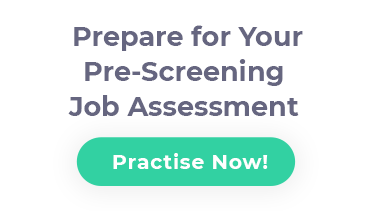Banking Tests & Recruitment Process Preparation – 2025

What Is the Hiring Process for Banking Positions?
Banks employ a strenuous hiring process for prospective candidates. There are about three total stages. These stages assess areas like social, emotional, and cognitive capabilities. The hiring process takes on average about two weeks to two months. The hiring process follows the outline below.
Application Process
The application is the company’s first impression of the applicant. Here, the candidate should describe their work experience, education, and other necessary information. Some companies require a tailored CV and cover letter as well.
At the bottom of the application form, there may be some questions. These questions will be both competency-based and personal inquiries about the candidate.
Banking Positions’ Assessments
The assessments are sent to the candidate after the application has been submitted. The results of the tests are reviewed hand-in-hand with the application form.
Applicants will receive the assessments via email with the request that they are completed within three to five days. These assessments are used because they offer the company an objective measure of the candidate’s behaviour and aptitude.
Banking positions have a handful of tests in place because the nature of the job is important and sometimes sensitive. The online assessments used for banking positions include the following:
- Clerical Aptitude
This aptitude test is similar to a checking assessment. The test taker will be presented with a handful of similar numbers and documents. The objective is to identify identical sets of numbers and documents. Each question is timed and multiple-choice.
- Numerical Comprehension
The numerical aptitude test ensures that the candidate has a basic understanding of mathematics. The questions concern fundamental operations, statistics, and percentages. The majority of the questions are accompanied by charts, tables and graphs. The candidate must demonstrate their ability to analyse this data and draw conclusions from it.
- Personality Questionnaire
The personality exam is a behavioural assessment that gauges the candidates work preferences and temperament. There are several statements that the candidate must rank based on how much they agree with them and how well they relate to the statement. The answer options range on a five-point scale from “Strongly Agree” to “Strongly Disagree”.
- Reading Comprehension
The reading comprehension assessment ensures the candidate understands novel and ambiguous information. The test presents a paragraph followed by three to five multiple-choice questions. The candidate must read the paragraph and establish a connection between the questions and the information.
- Situational Judgment Test (SJT)
The SJT is a behavioural assessment that gauges how someone acts in a work environment and under pressure. The test presents a series of hypothetical situations. These scenarios can play out conflicts or everyday occurrences and are followed by a response to the situation. The response must be marked by the candidate based on how appropriate they believe it was for the given situation.
Interview
The interview is the final stage of the selection process for open banking positions. Interviews are held in person at one of the company’s main offices. The assessors are usually a hiring manager and a senior member of the department.
Questions during the interview range from competency-based to job-specific. The job-specific questions will present a hypothetical problem and ask the candidate to propose a course of action or strategy to remedy the problem. The competency-based questions inquire about past behaviour as a way to predict the candidate’s future behaviour. Example interview questions are:
- Describe a time you have had to deal with an irate customer.
- Describe a time when you and a coworker disagreed on something. How did you handle this?
- Why are you interested in our company?
- What skills do you have that make you an asset to our company?
How to Prepare for the Tests for Banking Positions?
The online assessments are regarded as one of the most difficult obstacles in the entire interview process. The combination of the questions and the time limits create a barrier for those who find themselves underprepared when it comes time to take the tests. The stakes are especially high on account of the large cuts made during this stage. About fifty per cent of candidates are not invited to the next stage of the interview process due to their scores on the tests.
Preparing for these assessments creates a monumental difference in your scores. One of the most popular methods of preparation includes online practice tests. Online practice tests simulate the assessment’s conditions. This way, you get the full testing experience before you actually have to take the tests. You will get the opportunity to become comfortable with the questions and time limits, and you will be able to work out all of the kinks and get silly mistakes out of the way. Practising this way also helps you predict how well you will do on the bank’s online assessments. The practice tests give you the chance to see your score you, so you estimate your performance. Plus, your score is an indication of how much more practising you should do before test day.
The behavioural tests are difficult to prepare for in the same way as aptitude tests because of the difference in how they are scored. Behavioural tests are much more subjective. This means that one company could prefer one kind of answer while another company prefers a different answer for that same question. For the SJT and personality questionnaire, there are no definite right answers. The best way to be successful on these tests is by doing some background research on the company. Review the company’s values and other relevant information, so you can align your answers with the company’s expectations. If you feel you need more practice, run through some sample questions to get an idea of how you can work the company’s preferences into your answers.
Banks
Learn more about the hiring process in specific banks:
Banking Positions Hiring Process Tips
Banks are prestigious institutions that have been given great responsibility. To maintain their reputations, they try their best to only hire high-quality people to join their team. If you want to present yourself in this light, you must put in some dedicated preparation.
First off, the company will ask a handful of questions about the job itself and the competencies required to successfully complete the job. This information should be listed in the role description and possibly on the company’s website. Some general competencies that banks look for include:
- Customer-Focus
- Commercial Awareness
- Good Judgment
- Confidentiality
- Teamwork
- Communication
You should try your best to exude these qualities during the interview and in your answers. Practise answering the questions with these qualities by using the STAR (situation, task, act, result) method. Common interview questions for banks are:
- Where do you see yourself in five years?
- What are some major deals our bank has completed in the past year?
- What do you believe this job entails?
- Describe some of the stocks you follow. Why these stocks? Should I buy them?
- Where do you believe the global economy is headed?
- What are some of your failures? What have you learned from them?
- Describe a time you worked in a team. What strategy did you implement to make it better?
- What is your leadership style?
- How do you handle stress?
- What qualities do you find important for working in banking?
These questions give you a great opportunity to put your best foot forward and mould yourself into the most favourable candidate. With enough time and practice, you should be able to go into the hiring process as confident as can be. Best of luck!

